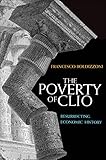The Poverty of Clio : Resurrecting Economic History / Francesco Boldizzoni.
Material type: TextPublisher: Princeton, NJ : Princeton University Press, [2011]Copyright date: ©2011Edition: Course BookDescription: 1 online resource (240 p.) : 4 line illusContent type:
TextPublisher: Princeton, NJ : Princeton University Press, [2011]Copyright date: ©2011Edition: Course BookDescription: 1 online resource (240 p.) : 4 line illusContent type: - 9780691144009
- 9781400838851
- Economics -- History
- Economics -- Research -- Methodology
- BUSINESS & ECONOMICS / Economic History
- Douglass North
- Karl Polanyi
- Moses Finley
- Witold Kula
- cliometrics
- cultural history
- culture
- economic history
- economic reasoning
- economic system
- economic theory
- economy
- individualism
- institutional approach
- intellectual crisis
- materialism
- medieval economics
- neoclassical economics
- neoclassical microeconomics
- neoliberal economics
- past generations
- policy recommendations
- social history
- social science history
- social science
- universality
- worldviews
- 330.9 23
- HB74.5
- online - DeGruyter
- Issued also in print.
| Item type | Current library | Call number | URL | Status | Notes | Barcode | |
|---|---|---|---|---|---|---|---|
 eBook
eBook
|
Biblioteca "Angelicum" Pont. Univ. S.Tommaso d'Aquino Nuvola online | online - DeGruyter (Browse shelf(Opens below)) | Online access | Not for loan (Accesso limitato) | Accesso per gli utenti autorizzati / Access for authorized users | (dgr)9781400838851 |
Frontmatter -- Content -- Preface -- Chapter 1. TRUTH ON THE CROSS -- Chapter 2. Economics with a Human Face? -- Chapter 3. The Fanciful World of Clio -- Chapter 4. The World We Have Lost -- Chapter 5. The World We Have Lost -- Chapter 6 Building on the Past -- References -- Index
restricted access online access with authorization star
http://purl.org/coar/access_right/c_16ec
The Poverty of Clio challenges the hold that cliometrics--an approach to economic history that employs the analytical tools of economists--has exerted on the study of our economic past. In this provocative book, Francesco Boldizzoni calls for the reconstruction of economic history, one in which history and the social sciences are brought to bear on economics, and not the other way around. Boldizzoni questions the appeal of economics over history--which he identifies as a distinctly American attitude--exposing its errors and hidden ideologies, and revealing how it fails to explain economic behavior itself. He shows how the misguided reliance on economic reasoning to interpret history has come at the expense of insights from the humanities and has led to a rejection of valuable past historical research. Developing a better alternative to new institutional economics and the rational choice approach, Boldizzoni builds on the extraordinary accomplishments of twentieth-century European historians and social thinkers to offer fresh ideas for the renewal of the field. Economic history needs to rediscover the true relationship between economy and culture, and promote an authentic alliance with the social sciences, starting with sociology and anthropology. It must resume its dialogue with the humanities, but without shrinking away from theory when constructing its models. The Poverty of Clio demonstrates why history must exert its own creative power on economics.
Issued also in print.
Mode of access: Internet via World Wide Web.
In English.
Description based on online resource; title from PDF title page (publisher's Web site, viewed 30. Aug 2021)


